Richard Dee's Blog, page 76
July 21, 2019
The Agony and the Ecstasy, Blog Hopping.
Here’s this weeks prompt, from #OpenBook
Does writing energize or exhaust you?
A non-writer would probably think that writing was quite a benign activity. All you do is sit at a keyboard (or in front of a piece of paper) and put words down. What could possibly be exhausting, or energising, about that? It’s not like you’re involved in any physical labour.

And yet; in case we forget, we are all writers, even if it’s just a letter that says, I love you. Or, I’m leaving. Or, I’m sorry to say that…. Just think of the emotion contained in writing those words. And how you feel after writing it.
Speaking personally, writing fiction does both to me,
depending on where I am in the process and what I’m writing about. That’s OK, I
understand and accept that it’s all part of the deal. In a way, my journey,
through agony and ecstasy, should be the same as the readers. Or even; dare I
say it, the characters in whatever I’m writing?
Let’s look at them separately.
Energising
This is the feeling I get at the start of a project; when I get a new idea to work on. Everything is fresh and exciting as the possibilities start to open out. Especially if it’s a new series or concept. There’s real excitement in meeting a new team of characters, exploring a new setting and finding out all about their particular world. The words just seem to flow as the story unfolds.
And as you get to action scenes; or moments of tension, there’s pleasure in seeing how your characters deal with them.

Exhaustion
This sets in when I’ve been writing any project for a while. The plot might be eluding me, words are not coming easily. I can see what has to be said but I can’t seem to express it. There could be tension or fear abounding in what I’m trying to write about. It doesn’t matter which emotion it is. It transmits from my head to the page and bounces back into my head; I find myself taking on the emotion that I’ve been expressing. I fell for the characters and their struggles. Add that to whatever else is going on in my life, it can overwhelm me. If I’m not careful, a new project will pop into my head and seem more exciting. Before I know it, I’ll be seduced by the energising feeling (see above). That’s when you have to grit your teeth and carry on.

Unfortunately, I find that writing series continuations tend to fall into this side of the equation. They can feel almost like a duty, especially if they’re prompted by the realisation that there were things you didn’t say the first time around. Or the added pressure that comes from writing to satisfy someone else’s request; even the feeling that this part might not be as good as the last, that can be pretty exhausting.
Although I’ve separated them, it’s perhaps better to accept that both feelings can happen at the same time; on the same page. A great idea for the plot can bring the sadness that comes with having to dispose of a character. The realisation that to achieve a perfect final scene, there will be gut-wrenching tension. And the sadness that comes with typing THE END, because it means that this particular journey is complete.
If strong emotions have been produced in the reader, then you can bet that the writer has experienced them as well. And if you’re a writer who writes every scene more than once, to polish it and produce the maximum effect, then you’ve had it worse than any reader.
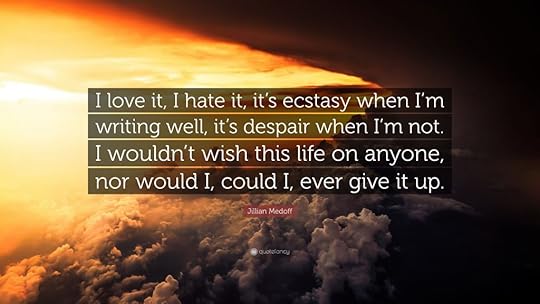
If this post has got you interested in any of my novels, you can get more details by clicking the Portfolio link. Or, to receive a free short story, The Orbital Livestock Company, just join my team of subscribers by clicking here.
I’ll be back on Thursday with another Showcase post, featuring an Indie Author with something to say. Please leave a comment below, then click the links to see the other great blogs on this hop.
You are invited to the Inlinkz link party!
Click here to enter
The post The Agony and the Ecstasy, Blog Hopping. appeared first on Welcome to my Worlds..
July 20, 2019
A Review. Finding David, by Stevie Turner.
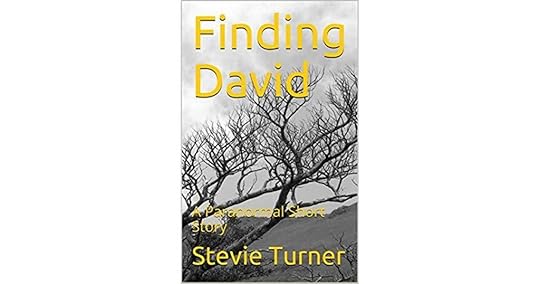
When Karen and Mick Curtis attend a demonstration of clairvoyance for the first time, Karen is singled out by the medium, Rae Cordelle. Rae has a message from Karen’s son David, who passed over to the spirit world many years before. The message shocks Karen and sends her on a journey of discovery, rocking her previously happy relationship with second husband Mick, David’s stepfather.
My Review.
A medium, a message and a mystery. The perfect ingredients for a very clever and well written short story. It reaches to the heart of everything. Not just, how can they know? and how can it be true? but – what does it mean if they are?
There’s always the danger, in a short story, that the plot
is rushed, or the action condensed. Nothing like that happens here, this is a
well written and well thought out tale.
Not to give too much away, but this story had me reading quickly, it’s very cleverly put together, with the end of every chapter leaving you desperate to turn the page. The theme is familiar, the desperate, overpowering need to know.
Karen needs to know what happened to David, Rae, the medium, says that she has the answers. Mick is sceptical. Then things get really interesting, as motives and secrets are revealed.
The writing is crisp and the description accurate, the characters are well-drawn. You can feel a certain emotion towards one character, then after a few more pages, shift it to another as the plot unfolds. The issues are not clear cut, although at the start you may be forgiven for thinking that they are. As the story develops the skill of the writer at leading you along a twisted path becomes more obvious. The ending is very satisfying, making me want to read more stories about the medium (I’m sure she has lots of interesting ones to tell), perhaps in a series of her own.
I have no hesitation in giving this story:

Stevie Turner has become another name on my ever-increasing list of authors To Be Read, the only question is, where to start?
Finding David is available here https://www.amazon.co.uk/dp/B07RLZF1JW
I’d love to get your comments, please leave them below. While you’re here, why not take a look around? There are some freebies and lots more content, about me, my writing and everything else that I do.
Meanwhile, I’ll be back tomorrow, with another #OpenBook blog hop.
The post A Review. Finding David, by Stevie Turner. appeared first on Welcome to my Worlds..
July 19, 2019
The Saturday Rewind. Sausages, with Cider
On the Rewind this week, a recipe from 2016.
Pork, apples and mustard, there’s a winning combination. How about if you shook it up it a little?
I found a recipe for a sausage and cider tray-bake with an interesting extra ingredient, which I tried recently. I can recommend it. In fact, we’ll be eating it again tonight!
Ingredients.
Potato Wedges,
Sausages
Peppers
Onions
Apples
I don’t do quantities for recipes like this. Some people like more onion, or pepper than I do. I just say quantities to taste depending on numbers. There’s just the two of us for this one; I used two large potatoes, 6 chipolata sausages, 1 large onion and 2 each of peppers and apples.
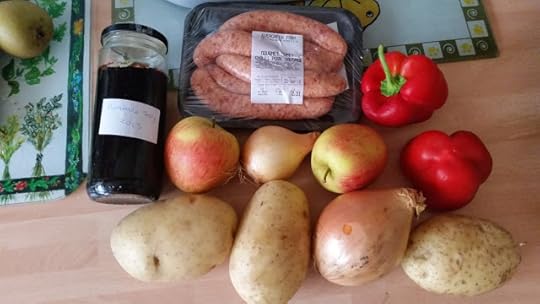
and for the sauce,
200ml Cider
15g Grain Mustard
15g Blackberry Jam This is the thing that really makes a difference!
Pinch mixed herbs.
Method.
Cut the potato into wedges, the apple into cored slices and the onion and pepper into thick pieces. To stop the apple going brown, wipe the pieces with a piece of kitchen paper soaked in lemon juice
Heat the oven to 200°C
Oil the potato and bake for 15 minutes,
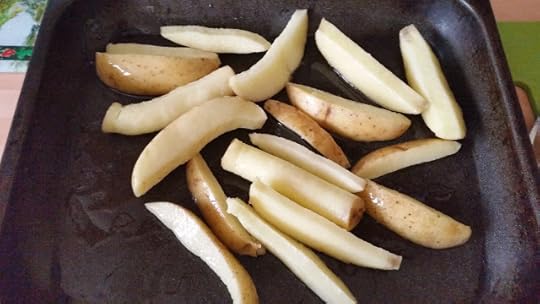
add everything else, mix and bake for another 30 minutes.
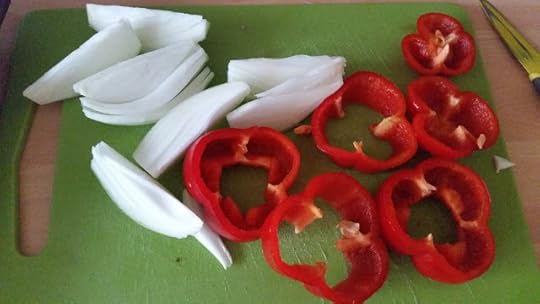
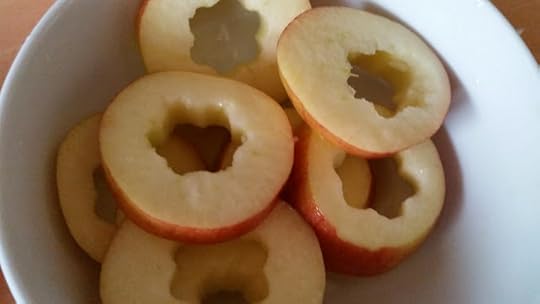
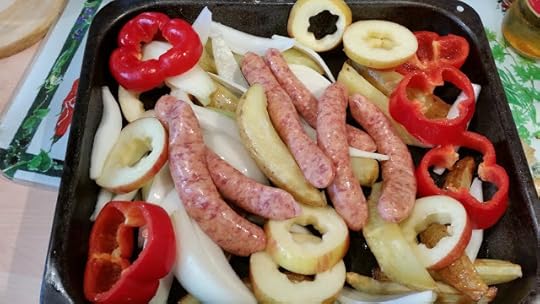
Meanwhile, heat all the sauce ingredients and simmer till thickened,
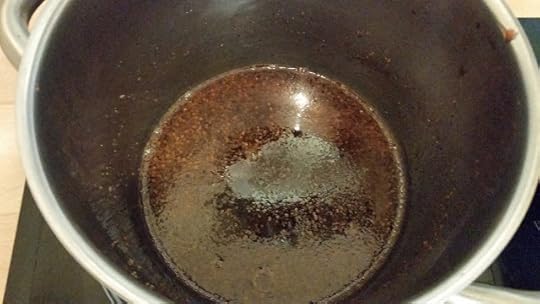
then pour it over the potato mixture and return to the oven for 5-10 minutes.

Stir and serve.

I’ll be back on Monday with another #OpenBook blog hop, have a great weekend.
The post The Saturday Rewind. Sausages, with Cider appeared first on Welcome to my Worlds..
July 17, 2019
The Indie Showcase presents, Kathy Shuker
Please welcome this weeks guest to the Showcase .
Hi. First, a thank you to Richard for inviting me onto his showcase.
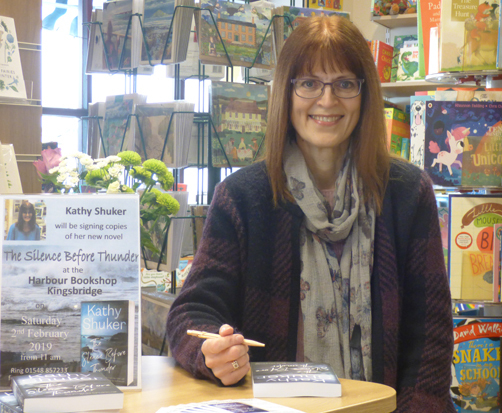
I’ve had a varied career. A creative child, I used to read and draw endlessly, and I was musical too and loved to play the piano, always escaping into my own world. But people don’t earn a living from things like that do they, or so I was told, so I trained as a physiotherapist and embarked on a sensible career. It was rewarding in many ways and I met some extraordinary and inspiring people along the way but it didn’t satisfy the creative side of me. So when a back injury obliged me to abandon physio when still young, I took advantage of the opportunity to spread my wings a little. I took a design course and then spent several years painting landscapes and seascapes in oils and watercolours, exhibiting and teaching. About fifteen years ago, I started writing novels and quickly became hooked. Of course, it was a learning curve and my first couple of books never saw the light of day, but I kept writing, honing my craft, and I have now published four novels. Sadly the painting has fallen by the wayside but I find the writing immensely satisfying and I’m thrilled that the feedback from readers has been so good.
I guess I’m
nosey, but I like to describe it as being interested in people. I’m shy too: I
am and always have been a watcher, a listener, never the one doing the talking.
These are useful attributes when it comes to writing fiction. I love hearing
people’s stories – everyone’s life is a story. I’m also fascinated by language,
by turns of phrase and idiom and by body language – all those signals we
transmit without saying a word. Sometimes a half-heard conversation sparks an
idea in my mind; at other times it might be just a casual phrase or the snatch
of an argument.
The general advice is to write what you like to read and I do. I like a good mystery, something intriguing which keeps me guessing. But I’m also fascinated by relationships and particularly by the secrets people keep and their reasons for doing so. It was an episode of ‘Who Do You Think You Are’ many years ago which started me thinking about it and I’ve become aware of it on many occasions since. So my novels are all mysteries though they don’t fit into the ‘crime’ category. They are character-driven and multi-layered. I think of them as ‘people’ books, warm, sometimes touching, even amusing at times but always with a compelling and intriguing plot line, propelling the reader through the story. Years ago, someone described my paintings as having a strong sense of place and readers say my novels do too. Three of them have been set in the southwest of England where I live and the fourth, Silent Faces Painted Ghosts, is set in Provence in France. Inevitably my own particular interests often take centre stage in them: art, writing, music and wildlife.
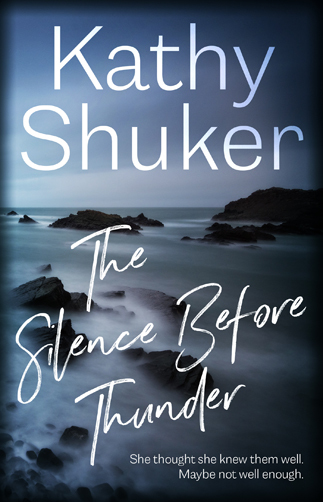
My most recent work, The Silence Before Thunder, was published in January of this year. Perhaps the closest to a whodunit I have yet written, it is set on the south coast of Devon, not far from where I have lived for the last eleven years. I love my adopted county and I hope that shows through in the writing. This is the setup of the story:
It’s midsummer and the annual writing workshops are about to begin at the sprawling Devon home of novelist Eleanor Lambe. A group of old friends arrive to act as tutors, bringing past rivalries and resentments with them. They include Eleanor’s former lover, the charismatic poet Frank Marwell, and his new fiancée.
The same night, Eleanor falls from her clifftop garden and lies in hospital, damaged, silent. Gossip says she jumped; the police rule out foul play. Her niece, Jo, sits at her bedside, waiting. Messy, complicated relationships mean tensions run high, made worse when Jo starts asking awkward questions.
But what really happened that night? And will Eleanor ever remember?
Reviewers describe the book as ‘gripping’ and ‘a page-turner’. There is no overt violence in the novel so I rejoice that, whilst the intrigue might keep you up late at night wanting to find out more, it won’t give you nightmares! I’m also grateful and thrilled that it was long-listed for the Dorchester Literary Festival writing prize 2019. A previous novel was long-listed last year too and in such a competitive marketplace the endorsement of my writing is much appreciated. Here is a short extract; taken from the beginning of Chapter One.
~~~~
An argument always leaves an echo. Vincent had gone, slamming the
study door behind him, but the row was still in the room, a tangible thing.
Eleanor heard the front door bang and turned away, feeling
infinitely weary. The box file containing the manuscript he had brought was
still there, insolently balanced on top of a pile of other papers, as if
claiming superiority.
‘No, I want you to read it,’ he had insisted. ‘Keep it. When you
get down from your high horse, you’ll see how good it is. OK, so I should have
asked you first.’ He’d held up his hands in mock defeat, looking anything but
apologetic. ‘Mea culpa. But you did promise to let me do another adaptation
sometime if the story seemed right. I took you at your word.’
‘I promised nothing of the kind.’
‘For God’s sake, Eleanor. After all the work I’ve put in, you could
at least have the decency to read it.’
The row had escalated; it had become
unpleasant. And now the manuscript sat there, taunting her. It was probably good – Vincent was a fine
playwright when he wasn’t dissipated – but he wasn’t to be trusted. The last
time she had agreed to let him adapt one of her novels for the stage he had
changed the script at the last minute, removing elements she thought essential
to the narrative and introducing a new character she disliked. She wasn’t going
to be tricked like that again. He was her cousin and always tried to play the
‘family’ card but their bonds weren’t that strong; she wasn’t going to
compromise her work for him.
Fretful, she began to pace up and down. The study was a long,
bright room with patio doors to the rear garden and a single large window to
the front where she now paused to look out.
It was seven o’clock in the evening on a late Friday in June and a
golden glow still illuminated the grounds. The house stood on a small coastal
headland in Devon, Eleanor’s own private land, which fell away down rocky cliffs
and through woods to the sea. An old rambling farmhouse had stood on the site
when she’d first bought it but permission had been granted to raze it and build
a new house on its footprint. The old farmyard was still there though. Shrubs,
paths and trees separated it from the house but Eleanor could imagine what she
could not see: the paved courtyard with a long run of low converted outhouses
on either side, each now a small apartment; the old barn, tidied up and fitted
out with a stage, heating, lights and seating.
The annual summer writing workshops were about to begin and all the old familiar faces would be gathering there to act as tutors, probably bickering as usual over which apartment they had been given. No doubt there would be the same comparisons of royalties and advances and the same complaints about how hard it was to make a living from writing. There would be camaraderie and stories of their youth, retold and endlessly embellished, but there’d be the old rivalries and petty squabbles too. She had heard it all before. She must have known most of them for more than thirty-five years, since they had all been students more or less. She was fifty-six already. Where had the time gone?
~~~~
As with all
my other books, The Silence Before Thunder is available across all major e platforms
and clicking here will take you to your preferred retailer. https://books2read.com/u/3Jy0PJ
It is also available as a paperback and is in stock in a number of Devon
bookshops but can be ordered online or at any bookshop by quoting the ISBN:
9780993225772.
Though I have little time for painting these days, I do still play the piano and I sing with a local chamber choir. I also have a keen interest in the environment and a fascination with learning foreign languages. If you are interested in my writing or have read any of my books, I’d love to hear from you. Writing is a very solitary occupation so feedback from readers is always welcome. I do appreciate the time and trouble taken to leave reviews; they are very precious. Also, a like of my Facebook page will keep you up to date with what I’m doing.
https://www.facebook.com/Kathy-Shuker-224131321118276
Or if you would like to join my mailing list, please contact me at kathyshuker@kathyshuker.co.uk. I will only send you an occasional mailing relating to new releases, appearances or special offers. I never share contact details with anyone.
My thanks to this weeks guest for a great post. I hope you all enjoyed it.
While you’re here, why not have a look around the site? There are FREE things and a whole lot more, just follow the links at the top of the page.
You might also like to join my team. I’ll send you a bi-monthly newsletter, filled with news, updates and extra content, as well as more about me and my worlds. You’ll also get a free short story and offers on my novels. Subscribe by clicking HERE
If you want to be
featured in a future Showcase, where you can write about whatever
(within reason) you want, then please let me know. Use the comment box below
and I’ll get back to you.
You can catch up on
previous Showcase posts by clicking HERE
Don’t miss the Saturday Rewind, next Thursdays Showcase post, and my musings every Monday.
Have a good week,
Richard.
The post The Indie Showcase presents, Kathy Shuker appeared first on Welcome to my Worlds..
July 14, 2019
The Hardest Part of all. Blog Hopping.
Welcome to another blog hop, with #OpenBook. Here’s this week’s prompt.
What was your hardest scene to write?
Writing Sci-fi, about things that have never happened,
usually in a place that doesn’t even exist can be hard work.
Surprisingly, you need a lot of research to write about the future, and of course (unless you are a time traveller) you have no practical experiences to base your scenes on. It’s all guesswork. Sure, you can be guided by things that you’ve done but that’s about it.
When it comes to describing spaceships and galactic life, I can use my knowledge of shipping and trade on Earth to make it realistic. And despite not having a military career, I’ve been shot at (twice as it happens; once was a M.I.G. 19), so I can describe how that feels. It’s not like you might think.
As for the rest? I just have to wing it. Fortunately, there is a lot that we can rely on in the future. We will still be human, wherever in the galaxy we might end up. We will still be at the mercy of all our human vices and emotions; I don’t suppose that they will have changed that much.
For me, the hardest things to write are the scenes where I have to kill a character. It leaves me in a real state, with as much emotion sloshing around as there would be if I was killing a real person. Apart from the fact that I’m not by nature a violent person; I think it’s because, to me, they are real people. Which might not be as weird as it sounds. I’ve created the character, given them a life, a voice and a job to do. It might only be a small job in the overall scheme of the book, perhaps it was just a prompt to keep the plot moving, but it was important, and they did it without questioning why. By way of gratitude, I then bumped them off!
To ease my conscience, I’ve tried other ways of getting them out of the story. I’ve sent them away, forgotten them or glossed over what happened to them after a certain point. But it was never the same, they would sneak back into my thoughts, demand to come back into the story or even ask for a story of their own (the cheek!).
In the end, you have to bite the bullet (so to speak) and just get it over with, but that doesn’t mean that you have to enjoy it.
In my space opera Myra,
there’s a particularly unpleasant character, an untrustworthy petty criminal. He’s after our hero’s love interest, she flirts with him even though she doesn’t like him. For the plot to work, I needed to get my good guys and bad guys together; I used him to do it, with the promise of a reward if he did. But it all goes wrong, the gangsters do what gangsters do and he paid the price. Although he’s not a person you could warm to, I still felt for him, the way I used him wasn’t very nice. His end was painful.
~~~~

Danno was released and he raced over to him. “See, Mr Van, I got them here, just like I said.” He grovelled, washing his hands with invisible soap.
“Thank you, Danno,” said Van. “You can go now.”
Danno stood his ground. “But, Mr Van,” he whined, “we had a deal.”
“Deal?” said Van dismissively. “I don’t recall any sort of deal.”
“But you said I could have the girl if I told you when they turned up, that’s why I called you when I knew they were coming. She actually took notice of me after years of treating me like I was some sort of fool.”
It seemed like Myra had set a train in motion. The colour drained from her face as the reality sank in. She gasped and gripped my hand. Van had crossed the room and was standing beside us, leaving Danno by the door.
He turned to Myra, a sly grin on his face. “Well, were you, my dear,” he inquired, “interested?”
Myra shuddered. “Not in a million years!” she exclaimed. Van turned back to Danno who was squirming. “There you are then,” he said.
Danno’s shoulders slumped. “But she said… I thought…” he moved towards Myra and the henchmen tensed.
Van waved his hand dismissively and they relaxed. “Very well then,” he said, “if you want her so badly, come and get her.”
Danno kept walking towards Myra, who moved behind me and Rixon; Van calmly took a pistol from his belt and shot him twice in the stomach, the noise echoed around the empty room. Danno took a step back with the force of the bullets, a mystified expression on his face. He coughed, the effort making him wince. He put his hand to his stomach and lifted it to his face. It was red with blood from the stain that was spreading across his shirt.
The effort of raising his hand was suddenly too much for him and it fell back to his side. Blood dripped to the floor; in the shocked silence the splashes sounding as loud as the gunshots had been. Sighing, Danno dropped to his knees, pushing his hands in front of him to steady himself. As his strength faded, he slumped to the ground, the blood forming a pool around his body.
Van replaced the smoking pistol in his
belt and turned back to us. We were all stunned by the casual way he had done
it. Myra was sobbing.
“He would not have made you very happy, my dear,” he said in that peculiar whisper of his, “whereas I will.”
~~~~
I’m welling up just reading it back, even though I wrote it more than four years ago. I can see it if I close my eyes, the empty bar, the shocked expressions, even the drifting smoke. And I can feel Myra’s pain; when she realises that it was partly her fault, if she hadn’t flirted with him for a laugh, it would never have happened. Not only that; all that’s about to transpire is down to her.
That’s the trouble with us authors, we don’t just feel our own, real-life emotions. We have a whole back catalogue full of our characters pain to feel as well.
You can get Myra by clicking here
If this post has got you interested in any of my novels, you can get more details by clicking the Portfolio link. Or, to receive a free short story, The Orbital Livestock Company, just join my team of subscribers by clicking here.
I’ll be back on Thursday with another Showcase post, featuring an Indie Author with something to say. Please leave a comment below, then click the links to see the other great blogs on this hop.
You are invited to the Inlinkz link party!
Click here to enter
The post The Hardest Part of all. Blog Hopping. appeared first on Welcome to my Worlds..
Book Review, Posted in the Past
I’m a big fan of research, writing Science Fiction I need to
do a lot, keeping up with the latest in Science and working out in my head
where I could use it as a base for things in my future worlds.
Which means that I know a bit about how long it takes to do it
properly.
Bringing me onto Posted in the Past.
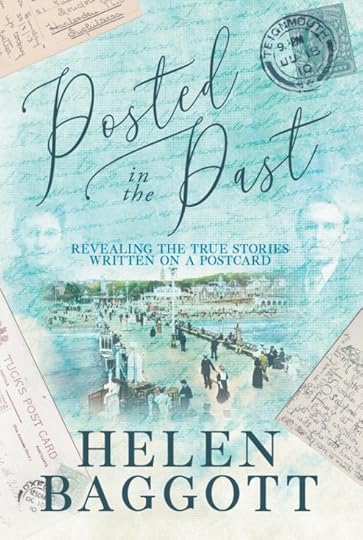
The postcard was a Victorian invention, like so much that we
take for granted in our ‘modern’ world. It was the email or text message of the
times and developed into a vast, worldwide phenomenon. When I was at sea in the
Merchant Navy, I used to send a lot of postcards to family and friends, they
were easy, cheap and you didn’t have to write a huge amount, just enough to let
people know you were alright. They also showed where you were in the world. I used
to arrive home on leave and spot them on grandparents mantlepieces.
At craft fairs and markets, you see boxes of old postcards
with their faded messages on the back. It always seemed to me that the collectors
were more interested in the picture or the stamp, now I’ve discovered, thanks
to this fascinating book, that the words can be just as exciting.
Helen Baggot has taken the cards and set out to find the
stories behind them. The lives and loves of the senders and recipients. And it
makes a surprising tale.
Taking the cards, she gives us a picture of both sides, then reveals the story (right down to the finest details), that she has gleaned from her research. And very often, the direction it takes might not be what you expected. Which is the delight of a book like this, the unexpected findings that are made, the links between us all that it reveals.
Starting with two cards from her own collection, Helen moves on to acquire more cards and discover some amazing stories, bringing the past to life in a way that’s quite different to the version we normally see. Instead of jerky black and white film, or the dry collections of facts in textbooks, these cards are alive with interest. Exams, jobs, love and loss, they all crop up in these scribbled notes. Then we come on to the people themselves, their lives, work and where they lived.
Helen has done A LOT of work to find out their stories, bring them back to life. I tried to find out a little about my grandparents and found it difficult, to do this with so many families is a real labour of love.
Personally, I find this sort of history so much more interesting than the stuff you are expected to learn at school, the minutiae of daily life and the social trends hold secrets and reveal things that lists of Kings and Wars don’t. And she has discovered some incredible coincidences and connections through these pieces of early social media. It’s quite revealing to see that, for most of us, life hasn’t really changed much, just got a bit glossier.
 Five Stars from me!
Five Stars from me!If you’re interested in the history that never made it into textbooks, I can’t recommend this book enough. It’s a book you can get lost in, or dip in and out of.
You can get a copy of the book from Amazon, CLICK HERE to see the product page (Opens in new tab).
There is a link to a website with all the postcards in the book in full colour; so that you can see them as the senders and receivers did. And there will be more; apparently, there are two further books planned.
I can’t wait.
The post Book Review, Posted in the Past appeared first on Welcome to my Worlds..
July 12, 2019
The Saturday Rewind. Tiger bread.
I love the marbled effect that you get on the crust of this loaf. It’s to do with the science, all you need to know is that the effect comes from a rice flour paste, applied before baking. I’ve posted this recipe many times before, but I think it deserves another spot. It’s so easy to do.
Here’s how to make Tiger bread.
First, make the bread dough as normal, these quantities will make one loaf of 860g and eight rolls of about 110g each. You might as well do both at once, they freeze perfectly and, if you’re making the paste, it’s just as easy to do a few more and use it all up.
For the dough
1000g Flour,
20g Yeast,
20g salt,
50g Oil, (I used Walnut Oil but Sesame or Olive would be just as nice)
650g lukewarm water.
Mix all the ingredients together and knead to develop the gluten. About 10 minutes by hand or 4-5 minutes in a mixer on slow-medium speed. Either way, check for a windowpane before leaving it to prove until doubled in size (1-2 hours).
While it’s proving, make the paste,
150g warm water
160g rice flour
5g yeast
30g oil
20g caster sugar
3g salt
Mix all the ingredients together and ensure that there are no lumps in the paste. Turn the oven on as appropriate to heat up to 240° C. After knocking back, dividing and shaping the main dough, leave it to rise for 20 minutes. Then GENTLY paint the paste on top of the part-risen dough with a pastry brush. Try not to deflate the dough too much. Leave it for another 20 minutes to continue rising before baking. The rolls will take about 18-20 minutes, the loaf around 40 minutes. The internal temperature should be at least 95° C when the loaves/rolls are baked. If you don’t have a thermometer, they will sound hollow when tapped on the base.
Here’s the science bit. Because it’s not flexible, the paste cracks as the loaf expands in the oven.
Here are some pictures of the pre-baked loaves and rolls, after pasting.
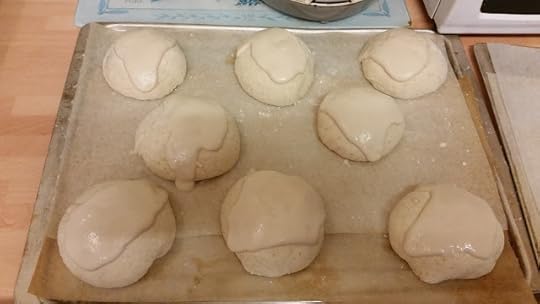
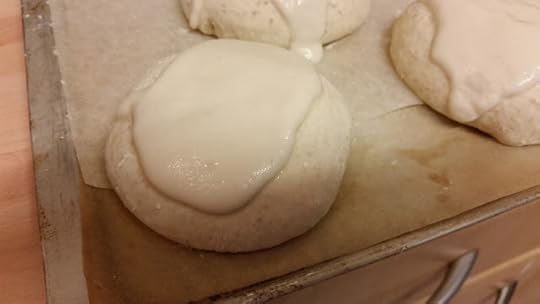
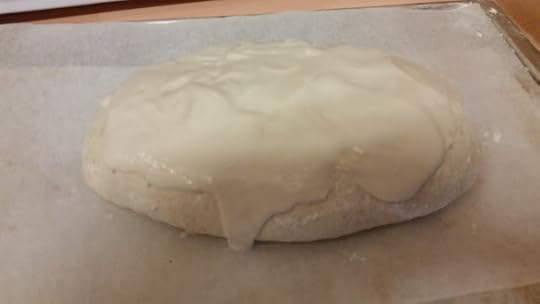
And this is how they look after baking.


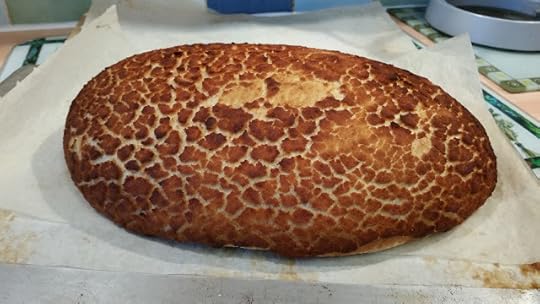
I hope that’s inspired you to have a go. If you have any questions about the recipe or the method, just leave me a comment below and I’ll do my best to help.
Meanwhile, I’ll be back on Monday, with another #OpenBook blog hop, have a great weekend.
The post The Saturday Rewind. Tiger bread. appeared first on Welcome to my Worlds..
July 8, 2019
The Indie Showcase presents, Barbara Spencer.
Please welcome this weeks guest.
How I
wrote one book and ended up with five
The Series: Children of Zeus
‘Where Historical Fiction and Fantasy collide’
After a decade or more writing
for children and young adults, I pretty much know my way around a children’s
book. And a couple of years ago, deciding I need a new challenge, I turned my
attention to writing magical realism for adults.
But what is magical realism and
how does it differ from fantasy? I think of fantasy as being set in a
mythological world in which there are rules but maybe not the rules we live by
in our humdrum human world. Magical realism takes place in our world and
follows its rules, except occasionally those rules are skewed.
Which is so exciting.
I had already found a story,
plotted it and written the introduction. And yes, I admit, I’m a plotter not a
pantser, using tables and graphs, blurbs and a storyline.
The title was never in doubt: The Year the Swans Came (See my blog –
why I wrote Swans) only the names of the characters.
I had called my main character:
Yöst. But
when I completed the first draft, I realised the name didn’t fit. The character
stalking his way through the story and dominating its action wasn’t Yöst – that
was far too gentle a name. And so Xander was born except the spelling very soon
mutated into Zande.
I had never planned to write for
adults, considering adult relationships far too complicated, yet in my very first
novel for this age group, I created Zande, who is divine but unbelievably
complicated. I promise, I’m not the only one to have fallen in love with him.
But why is he like this? What
has happened to tear this character apart?
As I explained in my earlier blog, in 2013 I sent The Year the Swans Came to the agent Felicity Bryan. Love the storyline and the writing but suggested I should introduce the magical element earlier … and this created quite a problem. Not able to resolve it, I decided to write a prequel, which would explain all. On the way, I attended a lecture about ‘book titles’, when it was suggested that titles should come from the first page or pages of your novel – and so, The Click of a Pebble was born.

‘You must promise never to speak out about your heritage,’ his grandmother said, her old voice fearful and faint, ‘because people fear anything different.’
‘Fear us!’ Yöst laughed in protest. ‘We are too few to fear.’
‘It makes no difference. You are carinatae, descendants of Zeus, magical creatures …’
Naturally … the writing of Click (as I call it) solved nothing. 100,000 words and three characters later, I had explained the magic but was no closer to ending Zande’s story than I had been at the beginning of the book. Instead, I had introduced a completely new story line with a raft of new characters, each one with a story to tell. This is one of the blurbs:
Persecuted throughout the centuries for their ability to shape-shift into swans and heavenly beings, three children, Yöst, Zande and a little girl, Tatania, are the sole survivors of the latest purge. Unaware of their real nature, Ramon, a gypsy farmer offers shelter on his farm in return for work. Striking up a close friendship with Rico, the only son in a house full of girls, it is Rico who helps Yöst through the first difficult year. As their relationship strengthens and deepens, Yöst begins to think of staying and making his life there as a farmer … forgetting that as carinatae, his date with destiny is approaching.
And so I began Book 2, An
Ocean of White Wings, hoping to settle the matter once and for all.
Has it?
No.
It has taken a third book, The Drumming of Heels to bring the series to an official close and
explain what happens to all three characters: Yöst, Zande and Tatania.
One last problem to solve.
The original book, The Year the Swans Came was set in Holland in 1951, two years after the third book of the trilogy, Children of Zeus, ends. Logically that makes it Book 4, except I’m not sure if you can apply logic to magical realism. In any case, it was published first because of the secret in it.
‘Secret?’
I felt the words ticking away inside my head like an unexploded bomb, ‘One that involves you all.’
Zande got to his feet in one graceful move. ‘Oh, that secret.’
‘You don’t play fair, Zande,’ I burst out.
‘Why would I possibly change the habit of a lifetime and play fair?’ I watched his face; grim, his eyes hooded.
‘Because we’re friends.’
‘So be satisfied with that.’
Right – that’s it.
Tomorrow, I really ought to start writing the opening chapter of Book 5, the sequel to The Year the Swans Came.
About Barbara Spencer:
In 1967, considering herself to be destined for a life of mediocrity, Barbara Spencer hi-tailed it to the West Indies to watch cricket, the precursor to a highly colourful career spanning three continents, in which she was caught up in riots, wars, and choosing Miss World. No stranger to schools and book-signings at Waterstones, after twelve years writing adventure stories for children and thrillers for young adults, Barbara began writing historical fantasy for an adult audience. Her first novel The Year the Swans Came was published in 2018.
Links.
Award Winning Author
www.barbaraspencer.co.uk
Connect with me on:
Twitter: @BarbaraSpencerO
Facebook: facebook.com/BarbaraSpencerAuthor
Blog spot: http://BarbaraSpencerAuthor.blogspot.co.uk/
The Year the Swans Came – Winner of a Chill with a Book – Readers
Award January 2019
Discovering Diamonds Review – March 2019

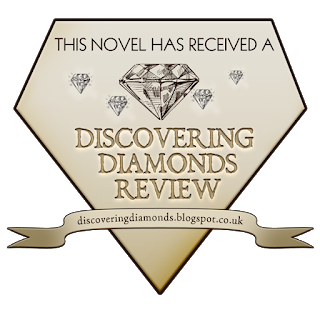
Barbara Spencer
Award Winning Author
www.barbaraspencer.co.uk
Connect with me on:
Twitter: @BarbaraSpencerO
Facebook: facebook.com/BarbaraSpencerAuthor
Blog spot: http://BarbaraSpencerAuthor.blogspot.co.uk/
My thanks to this weeks guest for a great post. I hope you all enjoyed it.
While you’re here, why not have a look around the site? There are FREE things and a whole lot more, just follow the links at the top of the page.
You might also like to join my team. I’ll send you a bi-monthly newsletter, filled with news, updates and extra content, as well as more about me and my worlds. You’ll also get a free short story and offers on my novels. Subscribe by clicking HERE
If you want to be
featured in a future Showcase, where you can write about whatever
(within reason) you want, then please let me know. Use the comment box below
and I’ll get back to you.
You can catch up on
previous Showcase posts by clicking HERE
Don’t miss the Saturday Rewind, next Thursdays Showcase post, and my musings every Monday.
Have a good week,
Richard.
The post The Indie Showcase presents, Barbara Spencer. appeared first on Welcome to my Worlds..
July 6, 2019
Let’s talk about the weather, Blog Hopping
Despite the recent snow in the Rocky Mountains, it’s summer in the Northern Hemisphere. Do your stories and worlds reference seasons and do they play into the plots of your books?
Another week, another prompt to get me thinking. As a writer of science fiction, you might think that the weather is the least of my concerns. After all, I have planets to build and galaxies to cross, who cares if it’s raining?
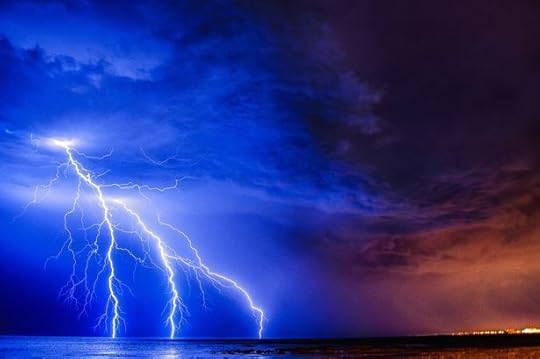
Personally, I think that it matters a great deal. I tell the people who attend my world-building workshops that characters are more than just the people who inhabit your world. The world itself is a character, as is the weather. Just think for a moment, does the weather affect your mood? Do you feel or act differently in winter or summer, sun or rain? In the same way as being cold and wet affects you, it can affect your characters and transfer the emotion to your readers. And of course, on a global scale, the weather affects where and how we exist. If it does that here, it will do so even more once we leave this planet and set off into the galaxy.
I try to use the weather, climate and meteorological conditions to enhance the setting, change the way the characters act and provide the little details that flesh out the story.
Let’s take a couple of examples.
For my novel Ribbonworld, I created a planet without a breathable atmosphere. So that people could live on this particular place, I had to put everyone under a huge dome. No chance for weather there, you might think. In fact, you’re wrong. The dome required an air supply, especially as it was leaky. This created a draft; wind if you like, as air was pumped in to replace the gas which was whistling out through the holes in the structure. In this way, the weather became an important character. Plus, water vapour condensing on the underside of the dome made it rain.
Talking of rain,

it also rains a lot on New Devon, one the main planets in my Dave Travise stories. In the words of Dave himself: –
It rains a lot in New Devon, so
they have invented the anti-static hat; Gaia knows how it works, but the rain
just bounces away from you so that you keep dry. At first, it looks weird seeing people walk along with an aura of
water all around them. There is a superb cabaret show with lights and dancers
creating multi-coloured waterfalls, but not on
this world, it’s a bit showy for the locals.
I think that little details like this, add to the creation of a more believable place. On Earth now, there are lots of little things that we could use in a description of our world to a visitor, they all enhance the experience and give clues as to the type of place it is.
In my dual-time thriller Life and Other Dreams,
my main character inhabits autumn, with its rain and cold, while his alter ego lives in a land of sunshine, this helps to create the mood of the narrative, keeping the two worlds separate and distinct.
All the space farms I’ve created,
in locations where they shouldn’t be possible, under the dome on Reevis, in space on the Orbital Livestock Company platforms and underground on Mars, in the Tharsis colony; all have controlled climates. This is essential to mimic growing conditions on Earth, enabling them to produce food for the colonists. And we’re not limited to boring stuff, during extensive research I’ve learnt a lot about hydroponics and soil. I also have things like large oscillating tanks to grow seafood in realistic conditions; as well as the more conventional means of production. See this post, Down on The Farm, for more of my thoughts on the subject.
I wrote a short story called When the Wave Comes,
a coming of age tale in which a large tidal wave was generated every year by the action of a planet’s moons. The inhabitants used it as a test of manhood, all who stood before the wave and survived were allowed to be a part of society, all who refused or ran were their slaves.
Once again, I digress. Maybe you’re used to it by now?
The point of all that was really to say that, as I’m inventing the setting for my stories, I’m not limited by Earthly constraints. Although it’s always a good thing to make it believable, it means that I can play around with all aspects of the conditions so that it keeps things interesting.
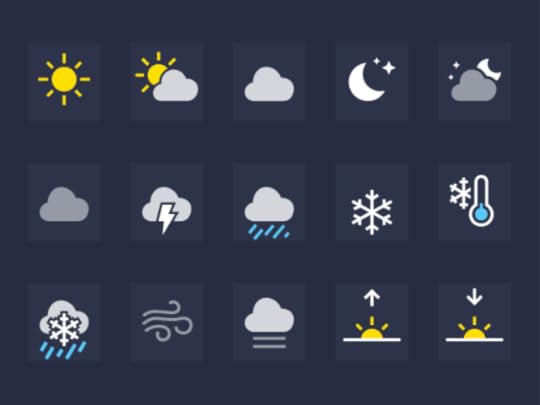
If this post has got you interested in any of my novels, you can get more details by clicking the Portfolio link. Or, to receive a free short story, The Orbital Livestock Company, just join my team of subscribers by clicking here.
I’ll be back on Thursday with another Showcase post, featuring an Indie Author with something to say. Please leave a comment below, then click the links to see the other great blogs on this hop.
You are invited to the Inlinkz link party!
Click here to enter
The post Let’s talk about the weather, Blog Hopping appeared first on Welcome to my Worlds..
July 5, 2019
The Saturday Rewind, Clotted Cream.
With summer coming, I thought that I’d revisit a post that I regularly repeat, a simple ‘how to’ that will help you recreate a Devon (or Cornwall) classic. You get the Strawberry Jam and I’ll tell you how to make your own Clotted Cream.
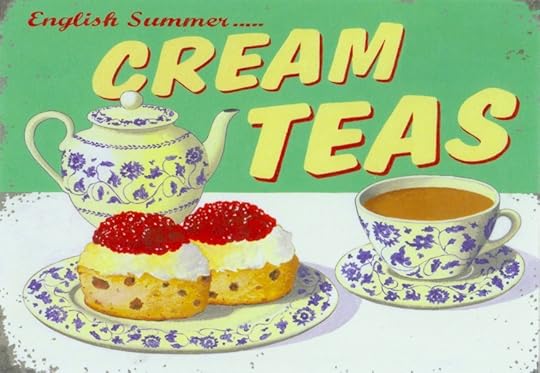
I’m a big fan of Clotted Cream, my Grandmother used to make her own and I remember it when I was growing up.
These days, you can get a supply fairly easily, several supermarkets sell it and even if you aren’t living in the West country, you don’t have to go without.
But, what if there was a simple way to make your own? Click the link below to find out how.
Homemade Clotted Cream
That’s it for the Rewind this week, join me again on Monday for another blog-hop.
Have a great weekend.
The post The Saturday Rewind, Clotted Cream. appeared first on Welcome to my Worlds..



